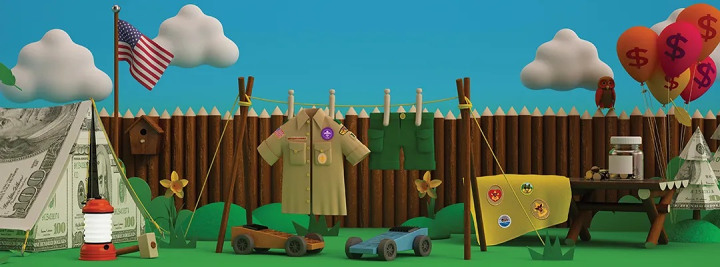Unit Fundraising

If other than a council-sponsored product sale, before deciding on a fundraiser, troop leaders should refer to Guides to Unit Money-Earning Projects. Here are some informative links, pertinent to all troop fundraising:
Unit Budget Planning Links
- Planning Your Troop’s Annual Program Budget
- Troop Operating Budget Worksheet
- https://scoutingmagazine.org/2018/02/build-better-budget/
Documents:
- Fiscal Policies and Procedures for Units FAQ
- Unit Money Earning Application
- Funding Your Scouting Program: A Training Video
- Guidance on Individual Scout Accounts
GUIDES TO UNIT MONEY-EARNING PROJECTS
A unit’s money-earning methods should reflect Scouting’s basic values. Whenever your unit is planning a money-earning project, this checklist can serve as your guide. If your answer is “Yes” to all the questions that follow, it is likely the project conforms to Scouting’s standards and will be approved.
1. Do you really need a fund-raising project? There should be a real need for raising money based on your unit’s program. Units should not engage in money-earning projects merely because someone has offered an attractive plan. Remember that individual youth members are expected to earn their own way. The need should be beyond normal budget items covered by dues.
2. If any contracts are to be signed, will they be signed by an individual, without reference to the Boy Scouts of America and without binding the local council, the Boy Scouts of America, or the chartered organization?
Before any person in your unit signs a contract, he must make sure the venture is legitimate and worthy. If a contract is signed, he is personally responsible. He may not sign on behalf of the local council or the Boy Scouts of America, nor may he bind the chartered organization without its written authorization. If you are not sure, check with your Council Professional Staff for help.
3. Will your fund-raiser prevent promoters from trading on the name and goodwill of the Boy Scouts of America? Because of Scouting’s good reputation, customers rarely question the quality or price of a product. The nationwide network of Scouting units must not become a beehive of commercial interest.
4. Will the fund-raising activity uphold the good name of the BSA? Does it avoid games of chance, gambling, etc.? Selling raffle tickets or other games of chance is a direct violation of the BSA Rules and Regulations, which forbid gambling. The product must not detract from the ideals and principles of the BSA
5. If a commercial product is to be sold, will it be sold on its own merits and without reference to the needs of Scouting? All commercial products must sell on their own merits, not the benefit received by the Boy Scouts. The principle of value received is critical in choosing what to sell.
6. If a commercial product is to be sold, will the fund-raising activity comply with BSA policy on wearing the uniform? The official uniform is intended to be worn primarily for use in connection with Scouting activities. Typically, council popcorn sales or Camp Card sales are approved uniform fund-raisers.
7. Will the fund-raising project avoid soliciting money or gifts? The BSA Rules and Regulations state, “Youth members shall not be permitted to serve as solicitors of money for their chartered organizations, for the local council, or in support of other organizations. Adult and youth members shall not be permitted to serve as solicitors of money in support of personal or unit participation in local, national, or international events.” For example: Boy Scouts/Cub Scouts and leaders should not identify themselves as Boy Scouts/Cub Scouts or as a troop/pack participate in The Salvation Army’s Christmas Bell Ringing program. This would be raising money for another organization. At no time are units permitted to solicit contributions for unit programs.
8. Does the fund-raising activity avoid competition with other units, your chartered organization, your local council? Check with your chartered organization representative and your Council Professional Staff to make certain that your chartered organization and the council agree on the dates and type of fund-raiser.
The local council is responsible for upholding the Charter and By-laws and the Rules and Regulations of the BSA. To ensure compliance, all unit fund-raisers MUST OBTAIN WRITTEN APPROVAL from the local council NO LESS THAN 14 DAYS before the fund-raising activity.
